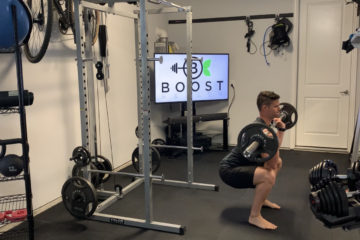
You have probably heard of holiday health and fitness challenges with the titles like “Maintain Don’t Gain” or “Holiday Survival”. I used to like these programs. Heck I even used to help design these types of challenges when I worked in population health management. Don’t get me wrong, I still like the general concept of these challenges where the objective is to help the participant engage in more healthy behaviours during the holidays than they maybe normally would. For example many of them award credit of some sort to the participant to exercise a certain number of days per week, or avoid too many sweet treats, for example. But I am beginning to wonder if there is an inherent problem with the mindset behind these. It seems that there is an assumption of an excuse to fall off the wagon built in: “Well it’s the holidays, and you know it’s going to be crazy with the stress, excess drinking, travel, over-eating, and lack of exercise”. The thought of “maintaining” or “surviving” could be viewed as an accomplishment I suppose, especially if you really struggle during this time of year. But I would argue that this is the wrong attitude. You might say that these are just catchy names of holiday challenges but I think there is more to it than that. I think we have to rewire our thoughts around holiday health.
I have a different challenge for you this year. Let’s not maintain our health during the holidays. Let’s not just survive during the holidays. Let’s progress our health during the holidays! I know it may seem challenging, or even impossible, but if you try my tips I am about to share I think you will have a great shot at coming out of the holidays healthier than you went in. The name of the challenge is the Extra BOOST Holiday Wellness Challenge! Let’s jump into the tips and how the challenge works.
1. Strength Training
Those who know me understand this one is non-negotiable. Since you can do a full body strength workout anywhere, anytime, with little or no equipment, in less than 30 minutes, there is no excuse in not getting this in. Full body training 3 times per week is preferred as you maximise recovery and volume. Full body training versus split muscle group training is still debated in the fitness industry. My article on full body versus split group training is easily my most hit page on the myboosthealth.com website on a daily basis. I included a few studies that show benefits of full body training over split group training include better hormone regulation, more calories burned, and more muscular hypertrophy. Also if you are someone who misses workouts, this guarantees you hit all your major muscle groups each week. Since we are making progress this holiday season, this is critical.
2 . Merge Tradition with Health
I love tradition with the holidays. I have probably even over-romanticised them a bit ever since I was a kid. I would remember favourite events from previous years and want everything to go the exact same way each season, which we all know is an impossible dream. For example, every year my dad and I would cook a turkey together at Thanksgiving. We would grill it outside, and the temperature in Kansas that time of year is usually pretty chilly. We would fight wind and even snow sometimes. This would lead to something, that would normally take 3 hours in an oven, to an all day outdoor extravaganza. As you might imagine this led to some pretty good adventures and stories. My dad passed away from pancreatic cancer in 2006 but I continued the tradition as best I could since then. Even after I switched to a plant-based diet 5 years ago, I kept on cooking the turkey each year for the rest of our family and friends. My point is that I know many of you probably have special traditions for the holidays, and some of them may not positively affect your health and fitness, but maybe we can make some small adjustments to these. Maybe we can still enjoy the traditions without sacrificing our health. Perhaps there is a holiday party you always attend but tend to eat unhealthy foods there. A solution to merge the tradition with better wellness is to bring healthy food and eat that instead. You could also plan an early workout with a friend or group the next morning to help prevent it being too late of an evening out.
3. Manage Stress
Increased stress is a very real hurdle during holidays for many people with travel,, family disagreements, finances, etc. Consumer Reports did a survey in 2011 of over 1000 Americans and found that over 90% of participants stress during the end of year holidays. The top stressors that came up were:
- Crowds and long lines: 68 percent
- Gaining weight: 37 percent
- Getting into debt: 37 percent
- Gift shopping: 28 percent
- Traveling: 25 percent
- Seeing certain relatives: 24 percent
- Seasonal music: 23 percent
- Disappointing gifts: 19 percent
- Having to attend holiday parties or events: 16 percent
- Having to be nice: 15 percent
- Holiday tipping: 12 percent
With all these possible stressors it is actually a really good time to put some practices to work that help activate your parasympathetic nervous system (aka “rest and digest”). With all the hustle and bustle of the modern world most people, myself included, don’t want to take the time to do what our body needs most – slow down. Meditation, earthing, and gratitude journaling are all great ways to de-stress and calm the nervous system. If you have every done any of these activities before I bet you told yourself that you should do this more often when you were done. I know I do! Let’s get in a rhythm with these and practice at least one of these disciplines daily.
4. Try Fasting
I should first say that fasting should only be attempted if you have not previously had a food eating disorder. I cover fasting methods and benefits at length in my article called 5 Tips For Everyone. Basically every time we eat our body becomes inflamed. It is hard work to digest food. It appears that giving the body a break from eating on occasion has benefits. In my article I share that intermittent fasting is better at reducing body fat, increasing muscle, and decreasing stress than a calorie restriction diet. One method of intermittent fasting that is doable for most folks is the overnight fast where you wait 12-16 hours from the last time you ate the night before. So if you ate at 7pm the night before then you would not eat until 7am the next morning. Easy right?
If you can fast a bit longer, like 24-48 hours, there are even more amazing benefits. A 2015 study in Cell Metabolism shared that this type of prolonged fasting can protect normal cells and organs from toxins and increase autophagy, which is like spring cleaning for your cells where damaged cells are removed and new ones are created. This even happens with cancer where cancer cells are killed off! With this in mind it seems that occasional prolonged fasting certainly has some long term health benefits. I have personally only done the over night fasting method but will complete at least one of these prolonged fasts over the holidays to test it out.
5. Get A Good Morning Routine Going
If you don’t already have a good morning routine, the holidays are a great time to get one going. With all the added activities and stress it really be helpful to start each day as well as possible. In my article 10 Tips for the Best Morning Routing for Health and Productivity I share what I think are the most important ways to start your day. A few that I think will be extra helpful to hone in on during the holidays are getting up early, doing fasted cardio, and productivity hacks.
There is no such thing as people who are “night owls” or “early birds”. We can all get up early with a simple reset of our sleep biorhythm. Some may say that they just can’t get to bed early and they get stuck in a cycle. My response is to get up at 4:30 or 5:00am a few days in a row and exercise and then see how easy it is to go to be at 8:30pm. Also avoid blue light at night before bed like your mobile phone and TV. Your body wants to go to bed on time but we trick it into thinking the sun is still up with the blue light that is emitting from these devices.
Doing cardiovascular exercise in a fasted state has been shown to be better than exercising in a fasted state for preventing weight gain, helping muscles adapt, improving insulin sensitivity, and improving glucose tolerance. These benefits can come in pretty handy especially during the holidays! Doing fasted cardio every day would be overkill, but on the days you are not doing strength training would be great. For example if you are doing full body strength training on Mondays, Wednesdays, and Fridays, then you could do fasted morning cardio on Tuesdays, Thursdays, Saturdays, and Sundays.
What do productivity hacks have to do with improving health during the holidays? Research is showing that being productive and checking things off your to do list is can actually boost your dopamine levels! Yes it really does feel good to get things done.
Also getting things accomplished in the morning can set the tone for the whole day. The more you can get done the less stress you will be from a time perspective at least. Studies have shown that humans work well in 90 minute windows without interruption and follow that with a break. This is because we operate in a natural flow called the ultradian rhythm where we can perform optimally for about 90 minutes and then need a break of about 20 minutes before restarting the cycle. I can tell you from personal experience this really does work. I have found it to be successful to work for 90 minutes and then taking a 20 minute walk outside. You come back fresh and ready to be productive. Many times I will be hitting a wall with focus or lack creativity towards the end of the 90 minute window, but when I come back after the walk it is usually easy to get past whatever hurdle was there previously.
6. Eat 5 Cups of Fruits and Vegetables Daily
This one is funny to me because everyone knows fruits and vegetables are good for you yet most folks don’t get the US dietary recommendation of 5 cups per day (3 cups veggie and 2 cups fruits).
A massive study in 2017 went on a mission to find out if fruits and veggies actually help you live longer. It looked at 18 countries, 7 geographic locations, and low, middle, and high income levels, and showed that 3-4 servings of fruits and vegetables reduces mortality rate! If you are not sure about measuring this out, an easy way to make sure you are getting enough is to have half of your plate or bowl comprised of fruits and vegetables.
7. Get 10,000 Steps Per Day
I know this may be a stretch goal for some folks, myself included. For example, there are lots of days where I get a big bike ride completed in the morning but then don’t come close to the 10,000 step goal that day. I tell myself it is ok since I got a good workout in that morning, but I know better. A 2017 study showed that even if you exercise, sitting too long during the day will still increase mortality rate.
What does this mean? It means to sit for a little while and stand for a little while at your work station. It also means that you still need to move throughout the day. If you practice the 90/20 minute work/walk productivity method I mentioned above it should be easier to hit that 10,000 step goal.
8. Build In Accountability
Having a supportive community is tremendously powerful in improving your health. I have shared several different studies in the past that show how community and mentorship can enhance performance.
Firstly, in a 2012 study, researchers at Kansas State University found that people who exercised with someone they thought was better than them increased their workout time and intensity by 200 percent.
A 2011 study in the Journal of Sport & Exercise Psychology found that participants were able to hold a plank longer when working with a partner and increased their plank hold by up to 24% when working out with a more capable partner. This ability for a weaker partner or team member to perform better in a group situation than they would on their own is called the Kohler Effect (named after researcher Otto Kohler in late 1920’s discovered)
A 2014 study in the International Journal of Nursing Studies found that older adults who had fitness mentors had higher success in overall retention and participation rates, as well as the best improvements in fitness scores as opposed to the group without mentorship. Interestingly the mentors were broken into several groups including young student mentors and peer mentors, and the mentorship effect was the same.
With this in mind, I wanted to build in accountability and a sense of community into the Extra BOOST Holiday Wellness Challenge in a few different ways. As such we are including a goals certificate that includes the objectives in this post. This certificate can go up on your refrigerator, in plane sight at your workspace, or anywhere it will be in view of yourself and anyone you may want to help hold you accountable (i.e. ask how that 10,000 steps per day goal is going). Just print it out and write in your personal touch to each goal. To add some fun and accountability we will track points for each completed goal each day. So if you completed 3 of the goals you would get 3 points that day. I will give away a pair of BOOST Health socks at random to one of the participants who completes the challenge. To complete the challenge just email me at paul.sandburg@outlook.com with your completed certificate and filled out points tracker by January 10, 2019. The points tracker can be used as print/write or excel digital version.
I had a client that once joked (or maybe he was serious) that the “holiday season” started with Halloween and went straight through until Easter. We are going to define the holiday season for this challenge as December 5, 2018 through January 5, 2019. You can start the challenge late though, as I think it will be helpful for you anytime.
The link to the challenge is here. It requires signing up for the Extra BOOST membership which is currently free! Let’s progress our health this holiday season together and encourage each other on!
Please click the link below to your favourite podcast app to listen in or watch the show on BOOST Health TV
Podcast: Play in new window | Download
Subscribe Apple Podcasts | Google Podcasts | RSS







